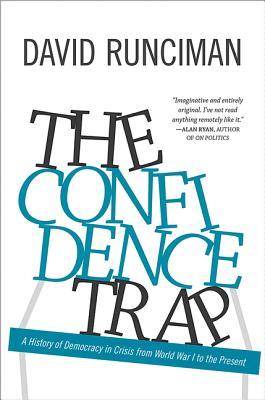The Confidence Trap is a book that, in spite of its many penetrating insights, peripheral as well as central to its thesis, on further examination is less striking and original than it promised to be.
Runciman begins with an introductory chapter about Alexis de Tocqueville’s early contribution to understanding how democratic nations cope with crises and proceeds to apply Tocqueville’s insights, and his own, in a series of chapters examining seven critical events that occurred during the 20th century, which, as he rightly says, was democracy’s first century, the 19th having been fundamentally an aristocratic one. His concern is to demonstrate how crises affect democratic polities, and how democratic polities are in turn reshaped by crises. In Runciman’s judgment, democratic crises are not moments of truth but
moments of deep confusion and uncertainty. Nothing is revealed. The advantages of democracy do not suddenly become clear; they remain jumbled together with the disadvantages. Democracies stumble their way through crises, groping for a way out.
This “capacity to stumble,” Runciman says, gives democratic societies an advantage over autocratic ones, owing to an innate adaptability that autocracies lack. But their adaptive qualities do not give them the further advantage of learning from past mistakes and avoiding future crises. Rather, their success in managing crises tends to make them complacent, even hubristic, by assuring them that they can survive their mistakes, and encouraging the temptation to conform long views to more immediate objectives. “Democracies are adaptable. Because they are adaptable, they build up long-term problems, comforted by the knowledge that they will adapt to meet them.” Here is what the author calls the confidence trap. Autocracies tend in a crisis to decide at once on a course of action and hold that course through thick and thin. Democracies are sufficiently flexible to experiment as they go, prepared to abandon a strategy that proves unsatisfactory in favor of something else. In other words, they are willing to muddle through.
The fundamental problem with Runciman’s thesis is that autocracy versus democracy is a false dichotomy. The argument is valid only so far as most democracies (the democratic Third Reich is one exception to the general rule) are also free societies, but a “free” society is not necessarily the same thing as a democratic one. The distinction is crystal clear, yet the fact that it has not been obvious for decades to politicians, journalists, historians, and the general public demonstrates the ubiquity of democratism in the world since 1945. England in the 17th century was clearly a free society; just as obviously, she was not a democratic one. Even so, as François Furet, the historian of the French Revolution, once noted, “By means of its Revolution, England managed to consolidate its tradition rather than condemning it.” Indeed, from one end of the century to the other this free (but not democratic) nation proved extremely adaptable in wrestling with a succession of major crises, including two revolutions, a regicide, and the restoration of the monarchy. What is more, a century and a bit later, the same nation (somewhat more “democratic” by then, but not much) and her allies were able to defeat, with the help of the chancellor of autocratic Austria, a regime that for years had been at war with most of Europe, and afterward to impose a peace that lasted, more or less, for 99 years. By comparison, the Treaty of Versailles in 1919, which Runciman credits with having vindicated the Western democracies at the start of the first democratic century, lasted just 20 years. So a constitutional monarchy with extremely limited popular representation proved itself more effective in coping with a century of crisis and a world war than did an alliance of democracies that had already granted universal suffrage to their citizens, or did so during or immediately after another world war. Democracy, then, was not the key to success here. A free, though greatly unequal, society was.
As for the claim that democracies generally muddle through crises better than autocracies do, I was reminded of Montaigne’s reflections on 16th-century France in the time of the Fronde:
[T]hrough the long license of these civil wars . . . [we] have grown old . . . in so riotous a form of government, that in truth it is a marvel that it can subsist. . . . In fine, I see from our example that human society holds and is knit together at any cost whatever. Whatever position you see men in, they pile up and arrange themselves by moving and crowding together just as ill-matched objects, put in a bag without order, find of themselves a way to unite and fall into place together, often better than they could have been arranged by art.
And indeed, the French monarchy survived for another 200 years. While Runciman is right to assert that free societies are generally more flexible and resilient than authoritarian ones, the truth is that all governments, and all countries, survive, and even progress, through a process of muddling through, just as their individual citizens muddle through in their private affairs. Muddling through is quite simply the way of all flesh in this world. It is likely not coincidental that the virtual motto of the nation in which liberty historically has flourished best, the English nation, is “Carry on!”—the byword of a people that has the longest history of free institutions resting not on democratic suffrage but instead on the historic recognition of the “rights of free Englishmen.”
[The Confidence Trap: A History of Democracy in Crisis From World War I to the Present, by David Runciman (Princeton: Princeton University Press) 381 pp., $29.95]

Leave a Reply